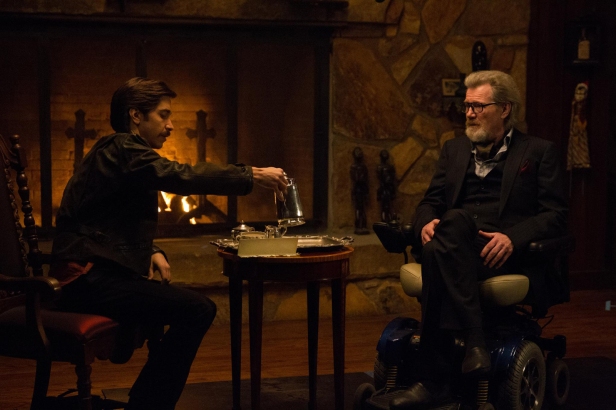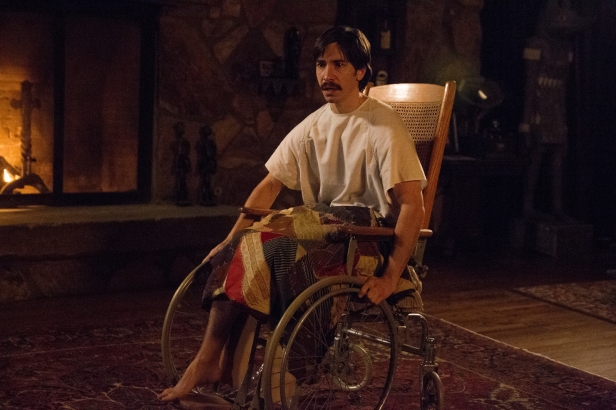Tusk (2014)
A truly transformative tale
It all started with a #WalrusYes or a #WalrusNo! Originally conceived while recording an episode of director Kevin Smith’s podcast show — SModcast episode #259, The Walrus and The Carpenter — where Smith and his long-time friend and producer, Scott Mosier, discussed an ad they found on Gumtree UK — which actually happened to be a hoax — where a homeowner was offering a living situation, free of charge, if the lodger agreed to dress and act like a walrus, once a day. A humorous conversation arose between the two hosts, lasting almost an hour, where Smith and Mosier reconstructed a hypothetical story based on the ad — part of the conversation can actually be heard as the Tusk credits roll. Following their discussion, Smith asked his Twitter followers to tweet ‘#WalrusYes’ if they wanted to see their hypothetical turned into a film, or ‘#WalrusNo’ if they didn’t. A vast majority of Smith’s following agreed that the film should be made, thus we find ourselves with Tusk.
Tusk is a truly bizarre picture in every sense of the word, and is possibly one of the strangest films I’ve had the pleasure of experiencing. Wallace Bryton (Justin Long) is an obnoxious podcast host who runs a popular show with his partner Teddy Craft (Haley Joel Osment), titled The Not-See Party — pronounced The Nazi Party — where Wallace finds amusing videos of people doing humiliating things online and explains them to Teddy in a mocking fashion. Their latest victim is the Kill Bill Kid (Douglas Banks), a teenager who accidentally slices his right leg off with a katana whilst showing off in front of his video camera. At the end of one particular program, Wallace announces that he plans to fly to the Great White North of Canada to interview, and viciously make fun of, the Kill Bill Kid for the next show.

When arriving in Manitoba, Canada, Wallace learns that the Kill Bill Kid has committed suicide due to Internet harassment, but decides to stay in town for an extra day with the intent of finding another weirdo to interview for the show. He eventually stumbles across a handbill written by Howard Howe, an elderly man who promises a bevy of interesting tales from his long and ‘storied’ life. Wallace swiftly ventures to the secluded home of Howard Howe (Michael Parks) — a softly spoken elderly man in a wheel chair — to hear about his strange adventures. Howe discusses his interesting life with Wallace over tea; in any case, his most outlandish tale happens to revolve around the period he spent stranded on a secluded island after a shipwreck, where his only companion was a walrus whom he named Mr. Tusk. Whilst chatting, Howe drugs Wallace’s drink and goes on to explain that he was never happier than the time he spent in seclusion, alongside Mr. Tusk. With his hatred for humanity and idolization of Mr. Tusk, Howe eventually unveils his repulsive hidden intentions to recreate his experience on the isle by surgically transforming Wallace into a walrus.
Sprinkled with Smith’s signature vulgarity, Tusk is certainly geared towards a specific group of patrons, those with a macabre sense of humor. Depending on one’s outlook, some might see the film as a twisted dark comedy, while others will perceive the picture solely as a gruesome body-modification flick. Fans of Smith’s podcast on the other hand, will delight with the feature’s countless nods and references to the SModcast show; several highlights include, a cameo by funny Hollywood Babble-On co-host Ralph Garman; Wallace’s ‘More Margaritas’ ring tone, which is a fan-made song created using Garman’s impression of Al Pacino; Ponder Rock — a place where a young Kevin Smith would often go to record his thoughts — being a reference to SModcast #224; whilst a fictional hockey player, Gregory Gumtree, is a homage to the original ad posted on Gumtree. After a string of commercial failures, such as Cop Out (2010), Zack and Miri Make a Porno (2008) and Jersey Girl (2004), director Kevin Smith, Clerks. (1994) seems to be restored and revitalized, back where he belongs, in the cult film circuit. With sharp dialogue being Smith’s strongest asset, Tusk is predominantly made up of monologues, flashbacks, scattershot humor and lengthy scenes that evoke television skits, yet remains lively and amusing, thanks to Smith and his talented cast and crew. Some will no doubt find the screenplay — also written by Smith — somewhat over indulgent, particularly in the picture’s third act, when Teddy and Wallace’s girlfriend, Ally (Génesis Rodríguez), seek the help of an unhinged investigator to locate Wallace, but Smith’s target audience should find themselves absorbed for the most part.

The film’s biggest triumph however, is Wallace’s deranged transformation from human to the deformed walrus, Mr. Tusk, as the overall effectiveness of the project truly hinges on the walrus costume itself. Equally disgusting, yet morbidly comical, the surgically altered walrus is difficult to shake off; particularly as the new Mr. Tusk screams and squirms in an attempt to maintain his humanity whilst Howe mentally conditions him to embrace his wild side; Wallace is seen crying and yelping out of pain and repulsion. The walrus suit, created by Robert Kurtzman of the legendary KNB EFX Group, From Dusk Till Dawn (1996) — chiefly made up from patches of human-looking flesh, stitched together — is admittedly terrific, making the big ‘creature reveal’ totally worthwhile.
Acting is also top-notch all round; veteran performer Michael Parks — who last worked with Smith in Red State (2011) — does a fantastic job as the repellent old seafarer, Howard Howe, creating one of the biggest sickos in recent memory, with his immersive, entrancing and perfectly over-the-top performance. Likewise, Justin Long, Drag Me to Hell (2009) — sporting a fuzzy moustache that serves as walrus-foreshadowing — owns the role of the offensive podcast host, Wallace, whilst giving the character considerable depth by revealing brief glimpses of his more fragile side, in turn, allowing us to feel for him, regardless of his harsh exterior. Moreover, when the picture goes ‘full walrus,’ Wallace’s transformation from man to animal is as sickening to witness as it is to imagine, thanks to Long’s dedication, almost overplaying the scenario in the best possible way. Supporting cast, Haley Joel Osment, The Sixth Sense (1999), and Genesis Rodriguez, Man on a Ledge (2012), make the most of their secondary roles, giving wonderful weight to their second tier characters. Look out for Smith’s daughter, Harley Quinn Smith and her real life best friend, Lily-Rose Melody Depp as a couple of irritated clerk girls.

This brings me to the heavily discussed role of Johnny Depp, Sleepy Hollow (1999), who turns up two-thirds of the way through the film as a drunk, amusingly funny French Canadian accented detective, Guy Lapointe. Here, an almost unrecognizable Depp — although billed as Guy Lapointe — gives his most berserk, yet hysterical, performance to date — and that’s saying something. Over the past few weeks, Depp’s questionable Guy Lapointe has been the subject of several debates, particularly amongst critics and Smith’s fans alike, with different views as to whether the character redeems the film, is part of an existing great flick, is the weak link in an otherwise great feature, or a terrible act in an all-round awful movie; either way, Depp’s performance is so utterly insane and left-field, it cries out to be seen. Furthermore, Kevin Smith claims that Tusk is the first chapter of an ‘apparent’ Canada based trilogy he’s planning, which includes the upcoming Yoga-Hosers (2015) — based on Smodcast episode #288 — and eventually, Moose Jaws, with Guy Lapointe returning for both features — for better or worse.
Far from perfect, Tusk is the guiltiest of guilty pleasures, a peculiar mix between The Human Centipede (2009), and The Texas Chainsaw Massacre (2003), which director Smith has somehow managed to successfully pull off. Additionally, this body-horror picture is unlike anything Smith has produced in the past and ranks as one of his best and bravest. Ultimately, anyone who sees Tusk will most likely give a different response as to how they feel about the film; some will love the picture because of its frightening subject matter, whilst others will no doubt hate it, for that exact same reason. There will be those who aren’t sickened by the concept at all and will probably perceive it as a wacked out comedy, which they’ll either get behind or not, and then there are all those middle ground opinions in-between. According to director Smith, ‘people don’t love or hate Tusk, they experience it, and just like herpes, carry it around with them for the rest of their lives.’ Finally, the film’s inventive use of the classic Fleetwood Mac tune, ‘Tusk,’ is quite frankly the icing on this priceless little picture’s cake, almost persuading me to change my tweet from #WalrusYes to #WalrusF@#kYes!
3.5 / 5 – Great
Reviewed by Mr. Movie
Tusk is released through Sony Pictures Australia
Movie was horrible…not sure why or how they listed it as comedy horror…no comedy at all and the whole story sucked…I feel cheated having paid $15 to get the dvd…don’t bother…
‘Tusk’ is one of those ‘either love it or hate it’ type of films! I thoroughly enjoyed but I can fully understand why some might dislike it.